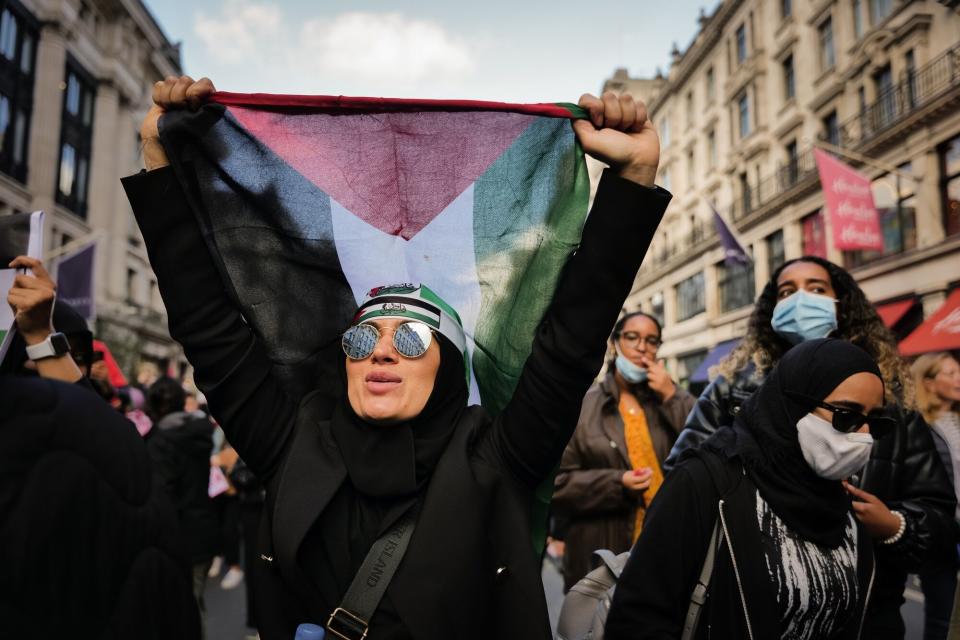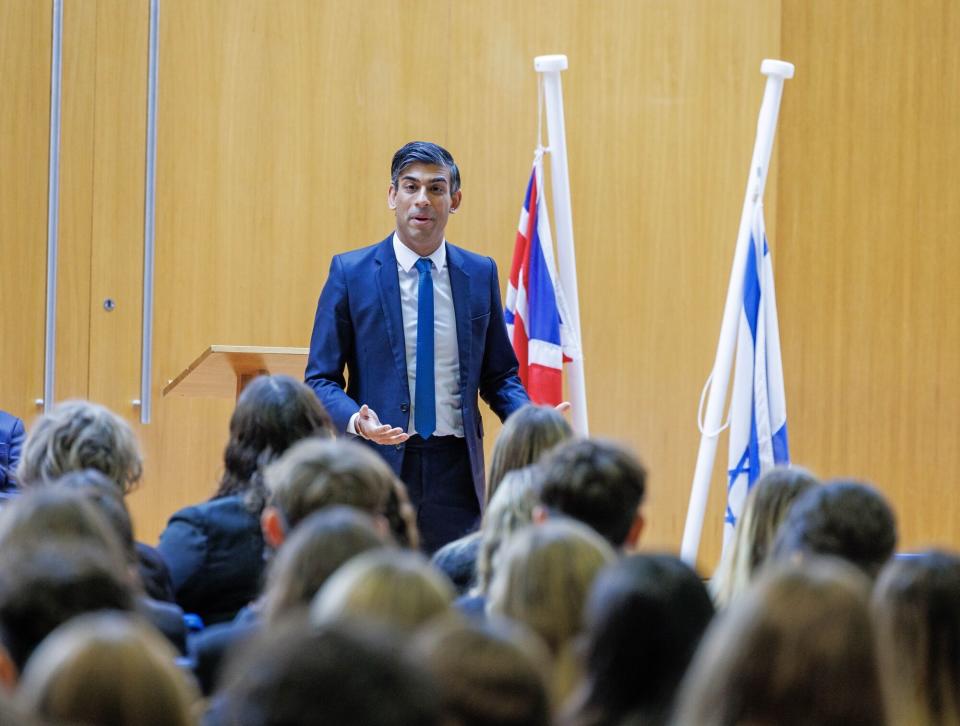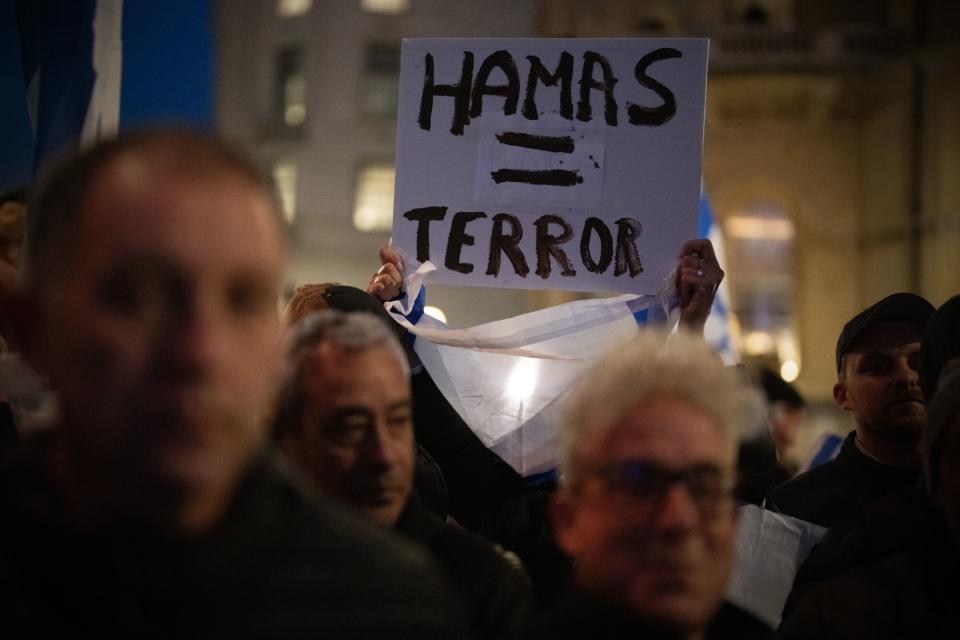In London, Jews Hide Their Faith While Islamophobic Graffiti Targets Muslims
- Oops!Something went wrong.Please try again later.
- Oops!Something went wrong.Please try again later.
(Bloomberg) -- At the New London Synagogue in North London, Rabbi Jeremy Gordon says some regular congregants have stopped attending services, while some Jewish schools have told pupils not to wear outward identifiers of their religion.
Most Read from Bloomberg
Ringgit Falls to 25-Year Low, the Worst Performer in Asia After Yen This Year
QQQ Advances in Late Trading as Tesla Rebounds: Markets Wrap
Across the Thames in south London, “Islam is evil” was daubed on at least 10 bus stops along a route passing primary schools. Mariam, a school governor who, like others, requested not to be identified in full, fearing online reprisals — said she worried children would see it. “It’s just a normalization of hate in their area,” she said.
In this city of 300 languages that has claim to being the world’s most diverse, a war that’s pitting Israelis and Palestinians against each other a continent away suddenly doesn’t feel so distant. Many Britons have friends and family in the region — including Scottish First Minister Humza Yousaf, whose in-laws are in Gaza.
On Tuesday night, an explosion at a hospital in Gaza City that killed hundreds laid bare the toll on ordinary civilians caught up in the conflict. Israel and Palestinian militants are trading blame for the blast, and the competing narratives are only likely to harden positions as disinformation and bitter wars of emotive words spread on social media.
“We hear the pain on both sides,” said Laura Marks, co-founder of Nisa-Nashim, a UK-based network for Jewish and Muslim women. She cited accounts of girls in the capital having their hijabs tweaked and a rabbi being spat at.
Britain’s mainstream politicians displayed remarkable unity following Hamas’s brutal incursion into southern Israel this month. The Houses of Parliament were lit up in Israeli colors, and the ruling Conservatives and opposition Labour Party expressed full-throated support for their ally’s right to self-defense.
But on London streets, fractures have appeared. Amid a rise in anti-Semitism and Islamophobia, British Jews have taken to hiding cultural symbols, while many Muslims say the UK political response isn’t paying enough heed to Israel’s duty to protect the approximately 1 million Gaza residents it’s told to leave their homes.
Just under 2 miles from Gordon’s synagogue, leaflets taped to a phonebox near Edgware Road call for information on missing Israelis. It’s a reminder of the impact on southern Israel, where at least six Britons died in Hamas’s attack.
“There is a heightened level of concern within our community,” said Jewish Leadership Council co-Chief Executive Officer Claudia Mendoza. The “pogrom” has “undeniably disrupted our daily lives and routines, necessitating increased vigilance.”
Mike Katz, Chair of the Jewish Labour Movement, said his daughters, who attend a Jewish school, had been advised not to wear their uniforms, and have found the situation “unsettling.”
As the death toll mounts in Gaza, British Muslims are also fearful. On Saturday, thousands of demonstrators marched to Downing Street pleading for the rights of citizens trapped inside the blockaded territory.
A day later, hundreds of British Jews gathered in Parliament Square for a vigil in memory of Hamas’s victims, waving Israeli flags and singing in Hebrew.
The gatherings capture some of the divisions in British communities — as elsewhere in Europe — over the decades-old conflict between Israelis and Palestinians. France has moved to the highest level of terror alert amid rising community tensions, while Germany has restricted pro-Palestinian demonstrations to help protect against the spread of anti-Semitism.
On Monday, lawmakers packed the House of Commons as Prime Minister Rishi Sunak and Labour leader Keir Starmer sought to strike a balance. Both condemned the attack by Hamas — proscribed as a terrorist organization by the UK, US and EU — and proclaimed Israel’s right to defend itself.
Britain’s murky history in the Middle East complicates matters. The UK issued a statement in 1917 supporting the establishment of a homeland for the Jewish people — known as the Balfour Declaration. It was then the colonial power in Palestine for about three decades until Israel was established in 1948.
Waves of immigration have brought adherents of both religions to Britain. There were 271,000 Jews and 3.9 million Muslims in England and Wales at the last census.
Sunak sought to allay Muslim concerns by increasing aid to Palestinians by a third and saying he’s working with Egypt to support civilians leaving Gaza. Starmer expressed concerns about access to food, water, electricity and medicines for those trapped there.
Labour’s leader has a tricky political balance to strike. He’s spent three years rebuilding the party after a crushing electoral defeat, distancing it from allegations of anti-Semitism that proliferated under his predecessor, Jeremy Corbyn. He’s also trying to avoid antagonizing Muslims, who studies suggest overwhelmingly vote Labour.
His approach has caused upset, with Muslim councilors in Oxford and Manchester quitting Labour. And after Starmer steered the party through its annual conference in Liverpool last week with his lawmakers broadly on-message, some MPs used Monday’s parliamentary session to voice concerns about the proportionality of Israel’s response.
“The horrific acts of Hamas do not justify responding with collective punishment of Palestinian people,” said Labour MP Richard Burgon. Imran Hussein described Gaza as an “open-air prison” saying Israel was in “clear violation of international law.”
As they sat inside a chamber that has been headed by a single Jewish-born Prime Minister — Benjamin Disraeli, more than a century ago — MPs also cited concerns about rising anti-Semitism.
Conservative MP Alec Shelbrooke said his Jewish constituents were “worried about how they would live a normal life.” Fellow Tory Andrew Percy said images of protesters in London with stickers depicting hang gliders — as used in the Hamas attack — were “deeply distressing” to British Jews.
Crime statistics bear out the rising tension. Reports of anti-Semitic incidents have increased seven-fold, while those of Islamophobia have doubled, the Metropolitan Police said last week.
In east London, Adam, a 25 year-old Muslim who has family in Gaza, told Bloomberg that Islamophobia now manifests itself more online and less in violent acts. He cited social media censorship of pro-Palestinian views, and alluded to Home Secretary Suella Braverman’s guidance to police that waving a Palestinian flag may not always constitute “legitimate” protest.
“It’s not a terrorist flag,” he said. “They shouldn’t be banning it.”
London Mayor Sadiq Khan — himself a Muslim — has sought to dial down tensions. He’s visited a synagogue, spoken with charities organizing aid to Palestinians and issued guidance to faith leaders on keeping places of worship safe.
Palestinian Ambassador Husam Zomlot also sought to dial down the temperature, telling reporters on Tuesday that the conflict is not between Jews and Muslims but rather is of a “political and legal” nature.
Katz, of the Jewish Labour movement, pointed to rising Islamophobia and anti-Semitism and said both communities should stress that British Jews and Muslims are not responsible for what happens in the Middle East. “You can’t play foreign policy out on the streets of London,” he said.
--With assistance from Kitty Donaldson, Emily Ashton, Siraj Datoo, Olivia Konotey-Ahulu, Jessica Loudis and Pratish Narayanan.
Most Read from Bloomberg Businessweek
Jeep’s Jump to $100,000 SUVs Risks Leaving Loyal Buyers Behind
The Ozempic Effect Is Coming for Everything From Kidney to Heart Disease Treatments
UBS Looks Beyond Credit Suisse to Bank Even More Billionaires
The Price of Money Is Going Up, and It’s Not Because of the Fed
©2023 Bloomberg L.P.




